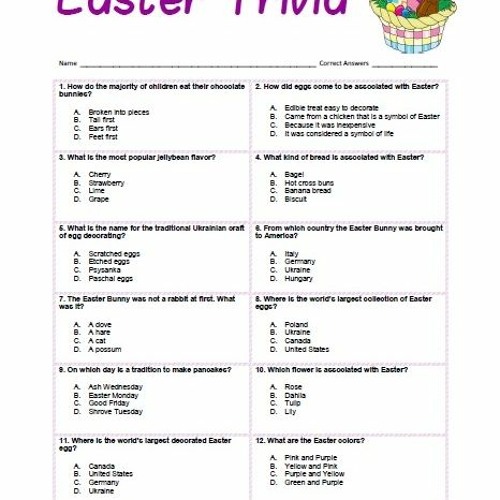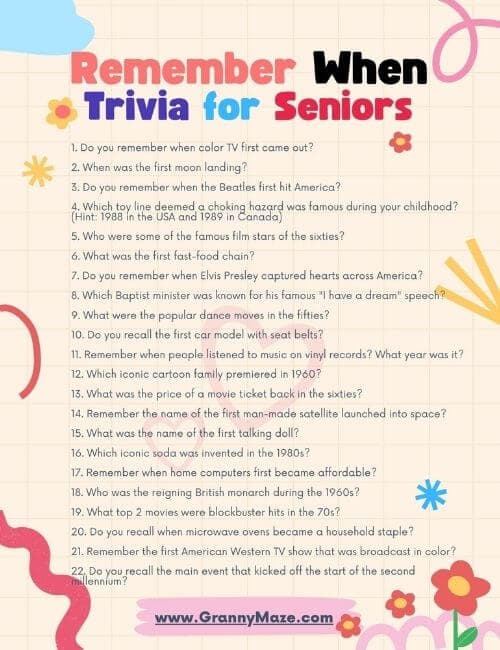Engaging seniors with dementia through trivia isn’t just about having fun—it’s also a powerful tool for mental stimulation and memory enhancement. Whether you’re a caregiver, family member, or simply someone who wants to make a difference, trivia games can be a wonderful way to connect with seniors while boosting their cognitive abilities. So, buckle up, because we’re diving deep into the world of trivia tailored specifically for seniors with dementia, complete with answers to make things easier for you!
Let’s face it, life gets a little more challenging when dementia enters the picture. But that doesn’t mean the fun has to stop. Trivia games are like little mental workouts that can help seniors stay sharp and engaged. Plus, they’re a great way to spark conversation, bring back memories, and even strengthen relationships between seniors and their loved ones. So, why not turn something educational into a bonding experience?
In this article, we’ll explore why trivia is so beneficial for seniors with dementia, provide you with a treasure trove of trivia questions and answers, and even throw in some tips to make your trivia sessions a roaring success. Whether you’re looking for easy questions, memory-triggering facts, or just a way to brighten someone’s day, we’ve got you covered. Let’s dive in!
Read also:Is Kyle From Hells Kitchen Transgender Exploring The Reddit Discussions
Why Trivia Works Wonders for Seniors with Dementia
Trivia isn’t just a game—it’s a mental exercise that can do wonders for seniors with dementia. Here’s why it’s such a big deal:
- Cognitive Stimulation: Trivia challenges the brain to think, recall, and process information, which is crucial for maintaining cognitive function.
- Memory Retrieval: Questions about familiar topics can help seniors access long-term memories, which are often preserved even in the later stages of dementia.
- Social Interaction: Playing trivia with others fosters a sense of community and belonging, reducing feelings of isolation.
- Boosting Confidence: Answering questions correctly can give seniors a sense of accomplishment and pride, which is incredibly important for their mental well-being.
And let’s not forget, trivia is just plain fun! It’s a great way to inject some excitement into daily routines and create moments of joy for seniors with dementia.
How to Choose the Right Trivia Questions for Seniors
Picking the right trivia questions is key to making the experience enjoyable and effective. Here are some tips to keep in mind:
Selecting Age-Appropriate Topics
Seniors with dementia often have stronger memories of events and facts from their younger years. So, focus on topics that are relevant to their generation. Think about movies from the 1950s, famous historical figures, or popular songs from their youth. These questions are more likely to resonate with them and trigger memories.
Keeping It Simple
Complex questions can be overwhelming, so stick to straightforward, yes-or-no questions or those with short, clear answers. For example, instead of asking, “What year did the Berlin Wall fall?” you could ask, “Did the Berlin Wall fall in the 20th century?” This makes it easier for seniors to participate without feeling frustrated.
Encouraging Participation
Make the trivia session interactive by encouraging everyone to join in. Even if someone doesn’t know the answer, they can still guess or share a related memory. The goal is to create a positive, supportive environment where everyone feels included.
Read also:Captain Pluto The Legendary Icon Of Adventure And Exploration
Remember, the aim isn’t to test their knowledge but to engage them in a meaningful activity that stimulates their minds and brings them joy.
A Treasure Trove of Trivia Questions and Answers
Now that we’ve covered the basics, let’s dive into some trivia questions specifically designed for seniors with dementia. We’ve got categories ranging from history and geography to pop culture and everyday life. Each question comes with an answer, so you don’t have to scramble to find the right response.
History Trivia
- Question: Which famous leader led the British during World War II?
Answer: Winston Churchill - Question: What year did the Titanic sink?
Answer: 1912 - Question: Who was the first man to walk on the moon?
Answer: Neil Armstrong
Pop Culture Trivia
- Question: Name the lead singer of The Beatles.
Answer: John Lennon - Question: Which movie features the song “Singin’ in the Rain”?
Answer: Singin’ in the Rain - Question: Who played James Bond in the movie “Dr. No”?
Answer: Sean Connery
Geography Trivia
- Question: What is the capital of France?
Answer: Paris - Question: Which country is known as the Land of the Rising Sun?
Answer: Japan - Question: What is the longest river in the world?
Answer: Nile River
These questions are just the tip of the iceberg. You can adapt them to suit the interests and abilities of the seniors you’re working with. And don’t forget, the answers are there to help you guide the conversation, not to put pressure on anyone to get it right.
Tips for Hosting a Successful Trivia Session
Hosting a trivia session for seniors with dementia requires a bit of planning and creativity. Here are some tips to ensure your event is a hit:
1. Create a Comfortable Environment
Make sure the setting is relaxed and inviting. Sit in a circle so everyone can see each other, and keep the lighting bright enough to read the questions if needed. Playing soft background music can also set the mood and make the session feel more like a party.
2. Use Visual Aids
Visual aids, like pictures or videos, can help seniors connect with the questions more easily. For example, if you’re asking about a famous landmark, show a picture of it. This not only makes the game more engaging but also helps trigger memories.
3. Keep It Short and Sweet
Seniors with dementia may tire easily, so keep the session short—around 20-30 minutes is usually enough. You can always extend it if the group seems energized and engaged.
Benefits Beyond Trivia: Building Stronger Connections
Trivia isn’t just about the questions and answers—it’s about the connections you build along the way. Engaging in trivia sessions can foster a sense of camaraderie among seniors, giving them a chance to share stories, laugh together, and create new memories.
For caregivers and family members, trivia is a great way to bond with seniors. It shows that you care about their interests and are willing to spend time with them in a meaningful way. And who knows? You might even learn something new about their lives and experiences!
Scientific Evidence Supporting Trivia for Dementia
Research has shown that engaging in mentally stimulating activities like trivia can have a positive impact on cognitive function in seniors with dementia. A study published in the Journal of Alzheimer’s Disease found that regular participation in cognitive exercises helped slow the progression of dementia symptoms.
Another study highlighted the importance of social interaction in maintaining cognitive health. Playing trivia with others provides both mental stimulation and social engagement, making it a powerful tool in dementia care.
Common Challenges and How to Overcome Them
While trivia can be a wonderful activity for seniors with dementia, there are some challenges to be aware of:
1. Short Attention Spans
Seniors with dementia may struggle to focus for long periods. To overcome this, break the session into smaller segments and include breaks for snacks or conversation.
2. Difficulty Answering Questions
If someone is struggling to answer a question, offer hints or let them pass. The goal is to keep things fun and stress-free. You can also modify the questions to make them easier or turn them into group discussions.
3. Emotional Reactions
Some questions may trigger emotional responses, especially if they bring up painful memories. Be sensitive to these moments and be ready to shift the conversation to a more positive topic if needed.
Conclusion: Let the Trivia Fun Begin!
In conclusion, trivia for seniors with dementia is more than just a game—it’s a powerful tool for mental stimulation, memory enhancement, and social interaction. By choosing the right questions, creating a supportive environment, and being mindful of individual needs, you can make trivia sessions enjoyable and beneficial for everyone involved.
So, what are you waiting for? Gather your group, grab your trivia questions, and let the fun begin! And don’t forget to share your experiences in the comments below. Who knows? You might inspire others to try trivia with their loved ones too!
Table of Contents
- Why Trivia Works Wonders for Seniors with Dementia
- How to Choose the Right Trivia Questions for Seniors
- A Treasure Trove of Trivia Questions and Answers
- Tips for Hosting a Successful Trivia Session
- Benefits Beyond Trivia: Building Stronger Connections
- Scientific Evidence Supporting Trivia for Dementia
- Common Challenges and How to Overcome Them
- Conclusion: Let the Trivia Fun Begin!
Trivia games are more than just a pastime; they’re a bridge to the past, a spark for the present, and a promise for a brighter future. So, let’s make trivia a regular part of life for seniors with dementia and watch the magic unfold!


